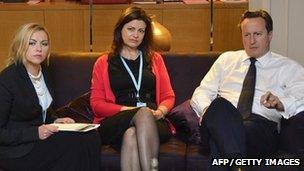Charlotte Church's media regulation hope after David Cameron meeting
- Published
Singer Charlotte Church says the prime minister will consider introducing a new independent media regulator following the Leveson inquiry.
She joined Hacked Off campaigners against press intrusion at a meeting with David Cameron at the Conservative party conference in Birmingham.
Some campaigners were concerned that Mr Cameron favoured continued self-regulation of the media.
But Church said she had been "comforted" by the meeting.
Dozens of phone-hacking victims have written to the prime minister urging him to keep an "open mind" on recommendations, external Lord Justice Leveson might make following his inquiry into media standards.
The letter from the Hacked Off campaign - signed by Church and other victims including actor Hugh Grant - said they believed self-regulation was "unsatisfactory".
The 26-year-old singer, who gave evidence to the Leveson inquiry, joined campaigners at the meeting to seek assurances Mr Cameron would consider steep fines for editors found to have broken the industry's code of conduct.
She said: "After meeting with the prime minister I have faith that he will accept any recommendations that would lead us to a genuinely independent regulator which we, the public, can trust and is not controlled by the editors.
"I found that very comforting."
Asked how she would feel if Mr Cameron subsequently rejected the demands of the campaign, she added: "We would be unbelievably disappointed.
"It was a difficult process to go through to relive a lot of those things that we relived to represent the best evidence that we could give to the inquiry.
"I absolutely felt my story paled in comparison to stories I have heard of ordinary people or ordinary families.

Charlotte Church and former police officer Jacqui Hames meet David Cameron
"I think it would be doing the biggest injustice to them really.
"We wanted to make sure that there was nothing in these murmurings that were worrying us [about Mr Cameron possibly rejecting powerful regulation] and that it wasn't all in vain and that something will come of it."
Journalist Brian Cathcart, who founded the Hacked Off campaign, said he was optimistic Leveson would call for a regulatory body with its powers enshrined in law.
But the campaign did not want to see MPs handed sweeping powers to punish the press every time journalists published articles which caused offence or upset powerful interests, he insisted.
Mr Cathcart added: "We are keen to see an effective, independent regulation system.
"I suspect that will require, if it is to be effective, some under-pinning in statute.
"What we are not calling for is some statutory censorship law that favours MPs being put in charge of what appears in the papers.
"That's a caricature of what is being put about.
"We are interested in legislation that would enable a regulator to do a good job in the interests of the public."
Mr Cameron had previously said that he did not want "heavy-handed state intervention" with the media, adding: "We have got to have a free press."
The Leveson inquiry was set up to examine media culture, practice and ethics, with the first stage examining relationships the press has with public, politicians and police.
It heard evidence from victims, journalists, media executives and proprietors, police and politicians over an eight-month period.
A second part of the inquiry, looking into the extent of unlawful or improper conduct within News International and other newspaper media organisations, will not get under way until police investigations are concluded.
- Published7 October 2012
- Published5 December 2012
- Published24 July 2012
- Published24 July 2012
- Published28 August 2012